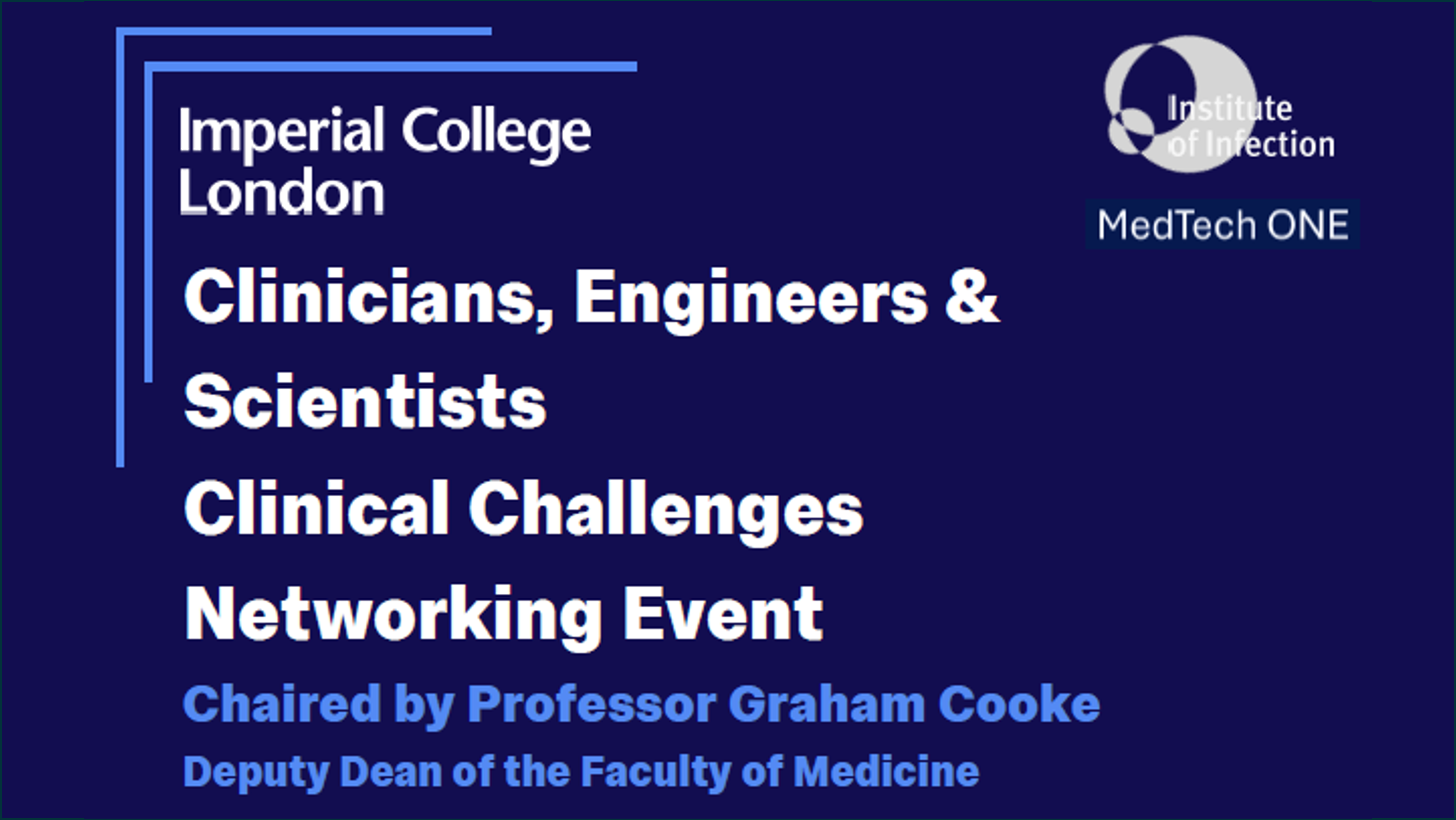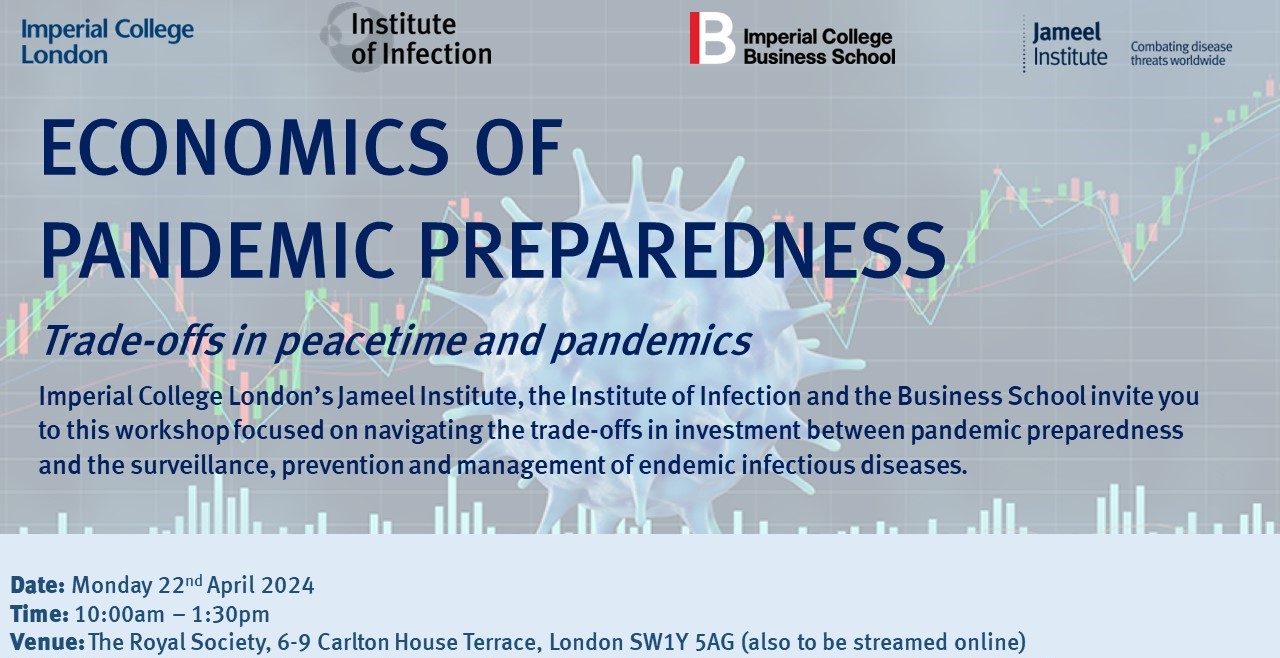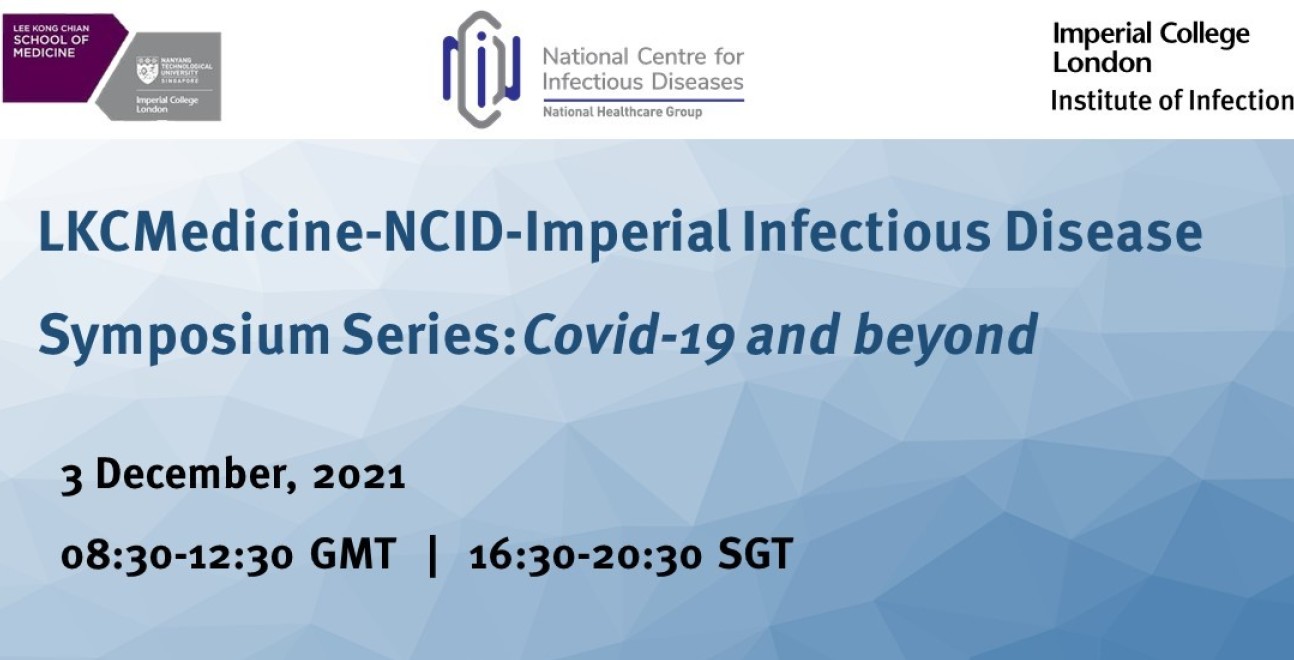UPCOMING WORKSHOPS
Please watch this space for upcoming workshops.
PAST WORKSHOPS
Clinician-scientist-engineer challenges workshop in infection
10 October, 16.00 - 18.00 | 58 Princes Gate
 This event, organised by Institute of Infection and MedTechONE, explored opportunities to apply engineering, technological, and AI solutions to clinical infection challenges and network with infection researchers, clinicians, and engineers.
This event, organised by Institute of Infection and MedTechONE, explored opportunities to apply engineering, technological, and AI solutions to clinical infection challenges and network with infection researchers, clinicians, and engineers.
Chaired by Professor Graham Cooke, clinically relevant infection challenges were presented, followed by discussions to identify technical, engineering, or AI solutions that may help to solve them. Solutions could include developing new technology (both software and hardware) or repurposing existing technology (including AI and machine learning).
The economics of pandemic preparedness: Trade-offs in peacetime and pandemics
22 April 2024, 10:00-13:30 | Royal Society, 6-9 Carlton House Terrace and online 
This symposium focused on how to navigate the trade-offs in investment between pandemic preparedness and the surveillance, prevention and management of endemic infectious diseases. The programme included talks from a range of organisational, discipline, and global perspectives as well as break-out discussions.
Speakers included Professor Jonathan Haskel (Bank of England, Imperial College London), Dr Edith Patouillard (WHO Dept. of Health Financing and Economics), Professor Els Torreele (Independent Researcher and Advisor, Geneva, Switzerland and Visiting Fellow, UCL Institute for Innovation and Public Purpose), Professor Susan Michie (Professor of Health Psychology and Director of the Centre for Behaviour Change), Dr Ifedayo Adetifa (Former General Director, Nigeria CDC), and Professor John Edmunds (London School of Hygiene and Tropical Medicine).
READ THE 'ECONOMICS OF PANDEMIC PREPAREDNESS' SUMMARY REPORT HERE
This event was co-organised and funded by the Imperial College London Abdul Latif Jameel Institute for Disease and Emergency Analytics, the Institute of Infection, and The Centre for Health Economics & Policy Innovation.
Egypt's hepatitis triumph and Pakistan's path forward
15 April 2024, 18:00-21:00 | City and Guild's Lecture Theatre 200
Pakistan has the world's highest global hepatitis burden. Egypt has recently successfully stamped out the disease with their ambitious hepatitis elimination campaign. The event included expert panellists discussing how lessons learnt from Egypt can help inform hepatitis disease management in Pakistan. Speakers included Professor Graham Foster (Previous National Clinical Chair for NHS England's Hepatitis C elimination programme), Dr Mohammad Hassany (Director of the hepatitis elimination programme at Egypt's Ministry of Health and Population), Dr Huma Quresh (National lead on the prevention and control of viral hepatitis in Pakistan), Professor Gamal Shiha (Professor of Internal Medicine, Mansoura University, Egypt), and Dr Shevanthi Nayagam (Consultant Hepatologist and Clinical Academic at Imperial College London).
Novel diagnostics for infectious diseases
25-26 March 2024 | The Royal Society, 6-9 Carlton House Terrace and online 
This two-day meeting delved into common challenges shared by diagnostics developers. Through presentations and panel discussions, attendees explored topics such as Technologies and Challenges, Regulatory and Adoption Challenges, and Regulation and Policy Perspectives.
This workshop was co-organised and funded by Imperial College London’s Institute of Infection, JPIAMR-funded B2B2B Network, London In Vitro Diagnostics Co-operative, NIHR Imperial Biomedical Research Centre, and DIAMONDS consortium. Funding is also provided by the UKRI IAA Healthy Society award and the Rosetrees Trust.
Celebrating Womxn in Malaria Research with the Malaria Network
8 March 2024, 10:30-16:00 | Flowers Building, G47A/B
This event will highlight the role of women in malaria research. It will feature speakers who are women/womxn working on malaria epidemiology and control, and related disciplines. We warmly welcome people of all genders to attend the event.
Organised by Imperial's Malaria Network of Excellence and supported by the Institute of Infection
Exploring AI’s impact on AMR 
9 February 2024 (9:45-15:00) | Flowers Building, South Kensington campus and online
Join us to explore AI’s impact on AMR across the translational pipeline, from basic and data sciences to application. It will be an exciting opportunity to bring together researchers from across disciplines, learn about the breadth of expertise across Imperial, and discuss critical issues pertaining to this field.
Speakers and Chairs include Aldo Faisal, Alison Holmes, Mauricio Barahona, Sophia Yaliraki, Anand Shah, Tim Rawson, Jesus Rodriguez-Manzano, Bernard Hernandez-Perez, Anna Barnard, Vjera Magdalenic-Moussavi, Elita Jauneikaite, Darius Armstrong-James, Damien Ming, Anna Barnard, Nick Croucher, Ash Myall, Emily Allen-Benton, and Azad Hussein (MHRA).
- Read the event summary, Impact of Artificial Intelligence on AMR: Common themes and challenges
- Explore the full agenda
This event is co-organised by Imperial’s Institute of Infection, AI Network, NIHR HPRU in Healthcare Associated Infections and Antimicrobial Resistance, and the Centre for Antimicrobial Optimisation (CAMO).
Developing Novel Strategies to Characterise and Study Modern Influenza Viruses
13 June 2023, White City
Every year, the flu viruses that are circulating are characterised by 150 National Influenza Centres worldwide, which informs the choice of vaccine for that season at the WHO Vaccine selection meeting. The serological assays – primarily hemagglutination inhibition (HAI) assays – used for analysis by these labs exploit the property of influenza viruses to agglutinate red blood cells. The tests are necessarily quick and inexpensive to enable the viruses to be characterized as they emerge across the season.
However, alternative solutions to these methods are now needed because recently isolated influenza strains, particularly of subtype H3N2, which cause much of the disease from seasonal influenza, have lost their agglutination ability due to reduced binding of the viral hemagglutinin (HA) to the sialic acid expressing receptors present on the surface of RBCs.
To address this challenge, on 13 June, 25 virologists, glycobiologists, synthetic biologists and bioengineers from Imperial College, UKHSA, other partner institutions, assembled to brainstorm on new solutions for serological assays. The meeting, which was co-organised by the Imperial HPRU and UKHSA and facilitated by the Institute of Infection, included a series of talks, opportunities for discussion and breakout sessions.
Institute of Infection Champions meeting
12 January 2023, South Kensington
The Institute of Infection Champions represent the breadth of infection research from across College. This meeting was an opportunity for them to meet collectively and discuss their visions of the future of topics including pandemic preparedness, vaccines, diagnostics, and infection in a changing climate.
National Centre for Infectious Diseases-Imperial College London Infectious Disease Symposium Series
9 December 2022; 09:00-11:15 GMT | 17:00-19:15 SGT

This virtual NCID-Imperial Infectious Disease Symposium hosted by the National Centre for Infectious Diseases (Singapore; NCID) and Imperial College London, took place on 9th December, 9:00 am-11:15 pm GMT (5:00-7:15 pm SGT).
This joint symposium explored areas of research priorities, complementary strengths, and avenues to further strengthen collaborative partnerships between Singapore's National Centre for Infectious Diseases (NCID) and Imperial College London.
Agenda included the following talks as well as discussion to identify priority areas for future collaboration.
- Computational models for environmental transmission and resilience study - Dr Kang Cheng Wei (NCID)
- Transmission dynamics of emerging pathogens: A response plan and execution - Professor Kalisvar Marimuthu (NCID)
- Intelligent large-eddy simulation and AI modelling to optimise HVAC system energy consumption and COVID risk in enclosed spaces - Professor Christopher Pain (Department of Earth Science and Engineering, Imperial College London)
- Human infection challenge to accelerate vaccine and therapeutics development - Professor Chris Chiu (Department of Infectious Disease, Imperial College London)
Pandemic Preparedness and Prevention Network planning meeting
7 October 2022
 This workshop brought together representatives from all four faculties to explore Imperial's impacts during the Covid-19 pandemic and to map our strengths to prepare for future pandemics. The afternoon highlighted many contributions from Medicine, Life Sciences, Engineering, and Business and reinforced the need for interdisciplinary collaboration.
This workshop brought together representatives from all four faculties to explore Imperial's impacts during the Covid-19 pandemic and to map our strengths to prepare for future pandemics. The afternoon highlighted many contributions from Medicine, Life Sciences, Engineering, and Business and reinforced the need for interdisciplinary collaboration.
Science Communication to Policymakers: Navigating Degrees of Certainty
21 February; 13:00-17:15
 This event was co-hosted by the Institute of Infection and the Royal Society and funded via the Policy Support Fund in Imperial College. It brought together scientists, policy experts, government advisers, and media to discuss the insights gained during the pandemic about the current system of science advice to policymakers.
This event was co-hosted by the Institute of Infection and the Royal Society and funded via the Policy Support Fund in Imperial College. It brought together scientists, policy experts, government advisers, and media to discuss the insights gained during the pandemic about the current system of science advice to policymakers.
Imperial students and staff can view the full recording of the event here.
View further coverage of the event on the Imperial College news site.
LKCMedicine-NCID-Imperial Infectious Disease Symposium: Covid-19 & beyond
3 December 2021; 8:30-12:30 GMT (16:30-20:30 SGT)

This virtual LKCMedicine-NCID-Imperial Infectious Disease Symposium: Covid-19 & beyond was hosted by the Lee Kong Chian School of Medicine (Singapore; LKCMedicine), National Centre for Infectious Diseases (Singapore; NCID) and Imperial College London. It explored critical aspects of Covid-19 research and experiences in Singapore and built future collaboration between Singapore and the UK.
Details of the meeting were captured in an Imperial news story.
